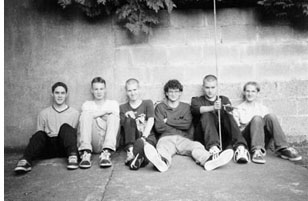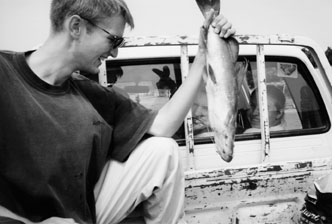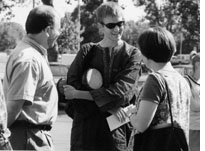
On service:
Ireland, Indiana, Mali
By Jacob Liechty
’02
 My
brother Aaron asked me if I would speak about service at Campus Worship Night,
and I said yes, but asked, “Why me?” I may, in fact, be the least
qualified person on campus to speak about service.
My
brother Aaron asked me if I would speak about service at Campus Worship Night,
and I said yes, but asked, “Why me?” I may, in fact, be the least
qualified person on campus to speak about service.
Most of the Mennonites here have been raised
in a culture of service – a culture where you eat doughnuts as a child
at the Relief Sale, volunteer with your MYF group as a teenager, shingle roofs
for [La Casa’s] “Help-A-House” day as a college student and,
after you graduate, go overseas to dig wells or teach with Mennonite Central
Committee. But I didn’t grow up with this. I grew up in Dublin, Ireland,
where people are mostly suspicious of service. There is no Relief Sale, no MYF,
no Help-A-House and no MCC in Dublin. Actually, there are no Mennonites in Dublin
– or at least not more than a couple. So sometimes I feel like a stranger
who has accidentally stumbled onto a campus crowded with servants.
 I
think there are at least two different forms of service. The first and most
obvious one involves giving from your material resources in order to satisfy
someone else’s needs. Much of the work of Mennonite aid agencies falls
into this category. When the Heifer Project ships cows to people who need cows
or when workers with the Mennonite Disaster Service rebuild a house destroyed
by a tornado, they are engaging in a very significant and very necessary form
of service. They are doing just what Jesus told them to do in the passage from
Matthew – giving food to the hungry and water to the thirsty and clothing
to the naked. I admire them for it. I may even go to join them in doing it when
I graduate. The danger, however, lies in believing that this is the only form
of service that is needed.
I
think there are at least two different forms of service. The first and most
obvious one involves giving from your material resources in order to satisfy
someone else’s needs. Much of the work of Mennonite aid agencies falls
into this category. When the Heifer Project ships cows to people who need cows
or when workers with the Mennonite Disaster Service rebuild a house destroyed
by a tornado, they are engaging in a very significant and very necessary form
of service. They are doing just what Jesus told them to do in the passage from
Matthew – giving food to the hungry and water to the thirsty and clothing
to the naked. I admire them for it. I may even go to join them in doing it when
I graduate. The danger, however, lies in believing that this is the only form
of service that is needed.
There is another form of service also described
by Jesus in the passage from Matthew. As well as feeding the hungry and watering
the thirsty and clothing the naked, Jesus instructed his listeners to invite
strangers into their homes and take care of the sick and visit the prisoners.
The stranger and the prisoner and the one who is sick have not only material
needs, but emotional needs as well. Whereas you can satisfy the needs of the
hungry, the thirsty and the naked with money and labor and time, you can satisfy
the needs of the stranger, the prisoner and the one who is sick only by entering
into relationship with them. You must make a personal commitment. You must be
prepared to sit at the table or at the hospital bed or outside the cell bars
and talk to them.
For me, talking to strangers
is hard. What if I have nothing in common with them? What if there is a nervous
silence? Talking to prisoners is hard. What if they hate me for seeming soft?
Talking to the sick is hard. What if they’re lonely and won’t let
me leave? All of this is harder for me than shipping cows or rebuilding houses,
because it demands that I give not just of my resources, but of myself. I must
make myself open and in doing it, make myself open to being hurt badly.
So, one of the forms of service that I most
admire is the service of listening. There are several listeners on this campus.
Often, you can’t tell who they are – but about halfway through the
semester, students who are exhausted and depressed start to turn up outside
their doors looking needy. The listeners take these students in, and sit them
down and tend to their souls. They do this simply by listening and offering
genuine sympathy, sometimes for hours. When the students leave they are no longer
depressed, but feel free. The listeners, on the other hand, sink back into their
chairs, exhausted.
 Listening,
then, is one of the most demanding services that you can perform, because the
people to whom you are listening are suffering deeply. They must take and take
and take in order to heal, and they may not be able to offer anything in return.
I imagine Jesus as a listener. I imagine him looking sad because he had shared
in so much sadness.
Listening,
then, is one of the most demanding services that you can perform, because the
people to whom you are listening are suffering deeply. They must take and take
and take in order to heal, and they may not be able to offer anything in return.
I imagine Jesus as a listener. I imagine him looking sad because he had shared
in so much sadness.
This summer past I went on Study-Service Term
to Mali. For the service portion I was sent to San, a town of 40,000 in the
rural southeast of the country. I arrived with 10 other SSTers, all of us believing
that we would spend our time helping at hospitals, or planting crops or teaching
at schools. Instead, we spent our time putting stamps on envelopes – for
hours and hours and hours. It wasn’t the most glorious work, but I suppose
it was the work for which we were most useful. And I was glad to do it, because
I was incompetent at most everything else and it seemed the most practical way
to help.
 In
spite of this, I suspect that the greatest service that I did in Mali was not
for the Malians, but for other members of my SST group. SST was hard for us,
sometimes almost impossibly hard. People contracted diseases, and became exhausted
and homesick, and it seemed likely that someone would go crazy or just fall
apart. We needed each other – badly. Sometimes, in the evenings, I would
draw a circle with our names, because that’s how I wanted the group to
be: a circle, with no one spinning off the side or falling out the bottom. My
service was to talk to those who felt left out, and to draw cards for those
who felt unhappy, and sometimes just to fan with my turban those who were suffocating
in the heat.
In
spite of this, I suspect that the greatest service that I did in Mali was not
for the Malians, but for other members of my SST group. SST was hard for us,
sometimes almost impossibly hard. People contracted diseases, and became exhausted
and homesick, and it seemed likely that someone would go crazy or just fall
apart. We needed each other – badly. Sometimes, in the evenings, I would
draw a circle with our names, because that’s how I wanted the group to
be: a circle, with no one spinning off the side or falling out the bottom. My
service was to talk to those who felt left out, and to draw cards for those
who felt unhappy, and sometimes just to fan with my turban those who were suffocating
in the heat.
This people-work is the second form of service.
It may involve giving money and time and labor, but more than that, it involves
giving company and affection and sympathy. It always takes place within a relationship.
If I wasn’t speaking on service, I think that I would call it love.
Junior Jacob Liechty of Dublin, Ireland, shared this
perspective during Campus Worship Night, Oct. 24, 2000. An English major, he
is a President's Leadership Award scholar and a member of the men’s soccer
team.
Return to December Bulletin
contents
The journey of
the magi, and travel journaling, editorial
by Rachel Lapp
Lifelong learning: the long approach home by President
Shirley H. Showalter
A small boat
on a big sea by Mary Lois Detweiler Miller ’50
Lessons from Africa by Sally Jo Milne ’67 with
Rachel Lapp
Pole position: uncluttering
down under by Greg Lehman ’93
Dear Diary: GC senior reflects on Dominican donation
by Alicia Montoya ’01
Return to Goshen College home
page

 My
brother Aaron asked me if I would speak about service at Campus Worship Night,
and I said yes, but asked, “Why me?” I may, in fact, be the least
qualified person on campus to speak about service.
My
brother Aaron asked me if I would speak about service at Campus Worship Night,
and I said yes, but asked, “Why me?” I may, in fact, be the least
qualified person on campus to speak about service. 

